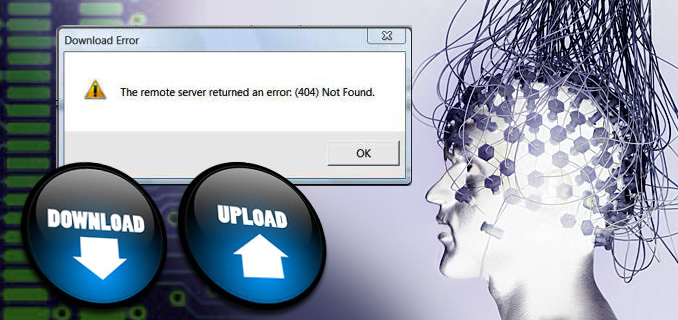Uploading and Downloading Your Brain - Good Idea?

Who wants to be first in line for the remote-brain-storage technology?
According to Russell Hanson, head of Brain Backups, the future is now and our minds will eventually be saved in electronic backups for our convenience. Futurists suggest that brain uploading and downloading should be available to the average household within two decades. One problem - the technology as it is now means that your brain can definitely be mapped, but it will be destroyed in the process.
You’re ok with that, right?
Also, scientists are not at this time able to guarantee that your consciousness will be preserved with your electronic data. Here’s the waiver for that.
They’re obligated to inform you that your resulting personality after mind reload may or may not be recognizable to your friends, family, or even your own self.
Sign here, please.
---
This Guy Wants to Help You Download Your Brain
By Monica Heisey | VICE
Ever wanted to download a copy of your own brain? Say you went through a serious car crash, for example—wouldn’t it be nice to take out your damaged brain and replace it with a replica you’d downloaded and stashed away prior to the accident? Or perhaps over time you could even build a collection of brains, each storing different memories, thoughts, and dreams that would equate, in a sense, to different versions of you? Something like that might come in handy when you’re trying to throw off various neuroses, like a fear of asking out hot people or an anxiety about bungee ropes, or a reluctance to believe that scientists could one day pull something like this off.
There are people trying to make this a reality. Last month, a Japanese supercomputer managed to simulate one second of human brain activity; last summer, some German scientists unveiled a remarkably high-res 3D digital model of the human brain; and last April, the Obama administration announced the BRAIN Initiative, a research endeavour projected to cost hundreds of millions of dollars and take over a decade to complete. Its humble goal? To map every single one of the tens of billions of neurons in the human brain, creating a "connectome"—a comprehensive diagram of the brain’s neural connections.
Theoretically, a complete connectome of an individual’s brain would constitute a copy of the pathways between every memory, thought, and experience that person had ever had. The implications of this kind of precise knowledge of a brain are far-reaching, but at this point still largely speculative.
Current procedures for brain imaging on a micro level tend to be incredibly time-consuming, costly, and require the destruction (via slicing and/or dyeing) of the brain being studied. But with the freakish, robotic march of progress, the technology required is being built and improved upon, and some futurists suggest that humans will be able to download and store copies of their brains within the next two decades. Naturally, labs the world over want to get there first, but I couldn’t find many that are already trying to sell the tech to you.
One I did find is Brain Backups. Headed up by 32-year-old Russell Hanson, the neuroinformatics startup based out of Cambridge, Massachusetts, aims to map human brains without destroying them. While other research groups are being formed and funded through government grants, Brain Backups hopes to crowdsource a great deal of its research costs by offering the future storage of all your neurons and synapses. I gave Russell a call to find out his thoughts on the matter.
VICE: Can you explain—in the simplest possible terms—what your company does or proposes to do?
Russell Hanson: Our team is developing the tools to image the brain non-destructively and non-invasively. The earlier methods in this field required slicing the brain very thin and imaging it on an electron microscope, which is both extremely slow and extremely expensive. We wanted to do this faster so researchers can learn how the brain changes over time, without destroying the brain every time they wanted to make a measurement.
OK, and how are you going to research this?
Obviously we’re talking about animal experiments here. We’re a small company with a big goal. We have some very talented engineers, scientists, and designers from MIT, Harvard, the Danish Technical University, UCLA, biotech, and pharma, and also the synthetic biology community in Boston. Our goal is to do this cheaply and non-destructively, so that anyone can image their brain, like they can map their genome affordably using a [personal genomics testing] service like 23andMe. I got into this a number of years ago when I asked how much space is needed to store the contents of the human brain in a class at MIT. It’s only become more interesting since then.
How much space is needed?
It depends a lot on how detailed the information you want to store is. The range is somewhere between 1,000 terabytes to 10,000 terabytes. With compression, this can be much smaller—this is an estimate of the uncompressed size.
Does the technology you want to use even exist yet?
The actual technology does exist, but it is cumbersomely slow and prohibitively expensive. Our equipment is quite real—we’re not working with hypothetical equipment. It’s incremental; we can do a certain set of things now, and we want to do a certain set of additional things tomorrow. And it’s just getting easier, just like building anything. Ford didn’t start out with their 2013 model, they started out with the 1908 Model T—the first car affordable to the middle class. And before that there were prototypes—19 of them, in fact, before they got to the Model T. The whole goal when I started this at MIT was to make the personal brain map affordable on a middle-class income.
[...]
Read the full article at: vice.com
Tune into Red Ice Radio:
Joseph P. Farrell & Scott D. de Hart - Hour 1 - Alchemical Transhumanism: Grimoire Technology & The New Man
Aaron Franz - The Philosophical Roots of Transhumanism & Technological Revolution
Aaron Franz - TransAlchemy, Save the Humans! & Transhuman Fundamentalism
William Henry - Stargate Technology & Transhumanism
Sonia Barrett - The Cosmic Game in 3D, Borg Mentality & Individual Consciousness
Tom Campbell - The Big TOE (Theory of Everything), Consciousness, Reality, Technology & Entities
Jim Elvidge - Are we Living in a Simulation, a Programmed Reality?
Anthony Peake - Hour 1 - The Infinite Mindfield: The Mystery of Consciousness






















